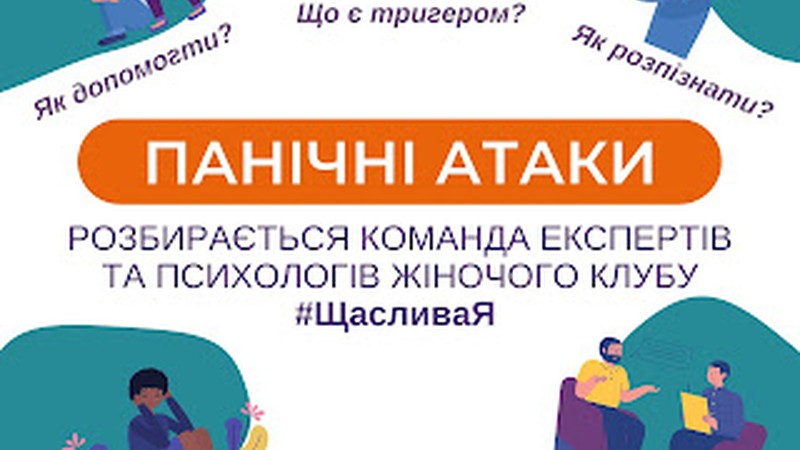Зараз ми всі у стані постійного нервового напруження через ситуацію в Україні, переживаємо за рідних в окупації та чоловіків у війську. Страх, відчай, тривога і паніка стають нашими звичними супутниками. Це все нормальна фізіологічна реакція на загрозу життю та здоров’ю, та на постійний тиск під яким перебувають всі українці. Затяжний стан тривоги заважає нормально жити та приймати раціональні рішення, ще й може призвести до серйозних психічних порушень.
Важливо вчитися керувати власними емоціями та необхідно зводити панічні настрої до мінімуму, особливо у воєнний час.
Ваша увага до власного самопочуття та емоцій близьких людей, може бути не лише прикладом турботи, а й вчасної допомоги.
Панічна атака – це стан, коли організм раптово на фізіологічному рівні реагує на почуття сильного необґрунтованого страху.
Важливо навчитись розпізнавати панічні атаки та знати її ознаки, адже частина з них можуть бути симптомами тяжких фізичних станів і, якщо ми виключаємо ймовірність панічної атаки, то людині потрібна швидка медична допомога. Складно, але можливо розібратися чи це саме панічна атака викликає відчуття втрати контролю над тілом, серцевого нападу чи близької смерті.
Важливо запам’ятати, що панічні атаки самі по собі загрози життю не несуть!
Якщо у вас спостерігалось 3 та більше описаних симптомів - це панічна атака. Тоді варто звернутись за допомогою до лікарів. Ці фізичні симптоми посилюють тривогу, сильна тривога породжує інтенсивні симптоми, вони стимулюють ще більший страх - коло змикається.
Причини панічних атак до кінця невідомі. Важливим є спадковість, тип особистості та агресивні зовнішні фактори - сексуальне чи інше насильство, тяжка хвороба, смерть близької людини, фінансові проблеми… Під час війни та окупації до всього додається полон, тортури, фільтраційні заходи окупантів, моральний тиск та ще маса негативних впливів.
Панічні атаки зазвичай починаються раптово, без попередження і не за графіком - спонтанні. Вони можуть завдати удару будь-коли: під час прогулянки з дітьми, за кермом автомобіля, у торгівельному центрі, під час відпочинку чи в укритті - ситуаційно. Або бути спровоковані вживанням наркотичних чи алкогольних речовин - умовно-ситуаційні.
Подія чи місце запускає панічну атаку? Спочатку може і не бути якогось конкретного тригера, він може сформуватися пізніше.. Наприклад, якщо перша панічна атака почалась під час ворожого обстрілу, то голосні звуки можуть стати пусковим гачком наступних.
У той момент, коли вас наздогнав напад, дуже складно себе контролювати, але ви можете допомогти собі швидко позбутися від нього:
🟣Вийти на свіже повітря або відкрити вікна, розстебнути одяг. Облити обличчя прохолодною водою.
🟣Важливо переключитися на дихання. Постарайтеся дихати глибоко, повільно і на повні груди. Для підвищення рівня вуглекислого газу в крові, подихайте в пакет або складені долоні, ніби хочете їх зігріти. Якщо відчуваєте, що вас “накриває” панікою і вам страшно - нормалізуйте дихання. Спробуйте дихання квадратом - повільний вдих на рахунок 1-2-3-4, пауза 1-2-3-4, видих 1-2-3-4, пауза 1-2-3-4. При цьому можете малювати очима квадрат. Головне, щоб увага переключилась на виконання конкретних завдань. Також деяким людям допомагає спів улюбленої пісні.
🟣Намагайтесь думати про щось хороше або заговоріть з ким-небудь. Спробуйте порахувати до 100 або перераховуйте машини, що проїжджають, якщо страх вас застиг в транспорті або на вулиці. Все це допомагає переключити увагу з тривожних відчуттів. Якщо причиною тривоги стало певне місце, поспішіть його покинути.
🟣Для стабілізації тіла упріться в стійку поверхню руками або вдавлюйте ногами підлогу. Такий стан дасть вам відчуття впевненості та контролю. Постійно повторюйте собі, що зараз це все закінчиться.Тривога, що виникла не заподіє вам шкоди, вона просто плід вашої уяви.
Якщо ж ви стали свідком панічної атаки у кого-небудь, ви можете допомогти людині впоратися з проблемою. Головне - не піддаватися паніці самому! Ви повинні бути спокійні.
джерело: https://www.bcrr.org.ua/
